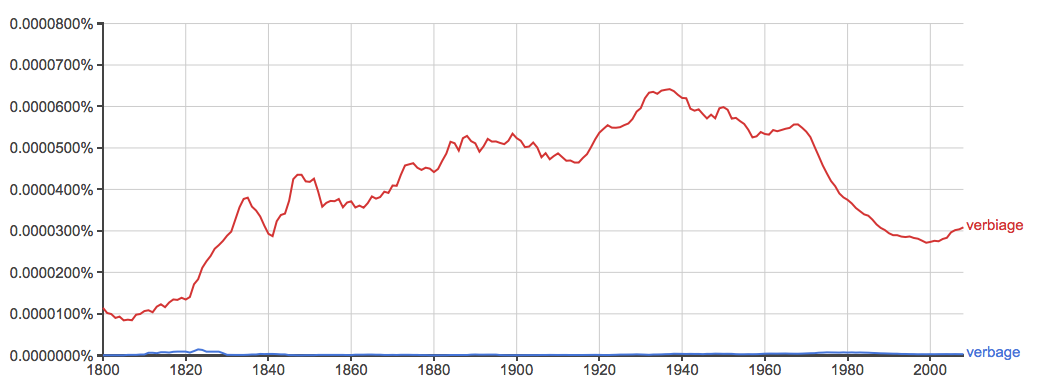The English language has many words that have multiple spellings, especially in British and American English. Sometimes, however, what seem like alternative spellings are actually misspellings. It can be difficult to remember which words are correct and which are incorrect.
Verbage and verbiage seem like they might be alternatives, but one is actually an error. Continue reading to find out whether you should choose verbage or verbiage in your writing.
What is the Difference Between Verbage and Verbiage?
In this article, I will compare verbage vs. verbiage. I will show you how to use (or not to use) each spelling, and I will show you a helpful hint to aid you in deciding whether to use verbiage or verbage in your writing.
When to Use Verbage
What does verbage mean? Verbage is not a word. Any time you are thinking about using verbage, use verbiage instead.
As you can see from the following graph, other than a brief uptick in the early 19th century and an almost nonexistent spurt centered around 1980, the usage of verbage in English books has approximated zero.

This chart isn’t scientific or exact, but it still illustrates that verbage is not commonly used or accepted.
When to Use Verbiage
 What does verbiage mean? Verbiage (pronounce ver-bee-ij) is the correct spelling of this word. It is a noun that means excessive language that is often needlessly ornate or opaque. Traditionally, this word has taken on a pejorative sense, but over time it has become more neutral. Today, it is often used simply in reference to language that is longwinded.
What does verbiage mean? Verbiage (pronounce ver-bee-ij) is the correct spelling of this word. It is a noun that means excessive language that is often needlessly ornate or opaque. Traditionally, this word has taken on a pejorative sense, but over time it has become more neutral. Today, it is often used simply in reference to language that is longwinded.
Here are some examples,
- The verbiage in my new phone’s terms of use is so boring that instead of reading all of it, I clicked the box and moved on with my life.
- The verbiage contained in the college sophomore’s English paper is shocking, to say the least.
- The downside is that vague verbiage makes it impossible to learn to make more granular and well-calibrated probability estimates. –The Wall Street Journal
- They were very different writers — Svevo dedicated to clarity and precision, Joyce with a weakness for rampant verbiage — and their differences emerged in a disagreement over the early fascist writer Gabriele d’Annunzio. –The Spectator
You should not use the phrase “excess verbiage,” even though it is common. To say “excess verbiage” is redundant.
The quality of excessiveness is contained within the meaning of verbiage, so it does not require the additional adjective. The same goes for many other adjectives, like complex and flowery.
How to Pronounce Verbiage
How do you pronounce verbiage? Verbiage is pronounced ver-bee-ij. A common mispronunciation of the word is ver-bij, which has probably led to the common misspelling verbage.
Trick to Remember the Difference
 Here’s a helpful trick to remember verbiage vs. verbage.
Here’s a helpful trick to remember verbiage vs. verbage.
You should never use verbage. It is not a word. Between these two words, verbiage will always be correct. You could also consider restructuring your sentence so that a different word will fit.
If you are set on using one of these two words, you can remember to use verbiage by repeating the phrase “I should use verbiage” to yourself, since the word verbiage contains an I.
Verbage contains no I, and should not be used by anyone.
Summary
Is it verbage or verbiage? Verbage and verbiage seem like two spellings of the same word. However, verbage is an error. There are no situations in which its use is acceptable.
Verbiage is the correct spelling of this word. It refers to excessive, intricate language. You can remember to avoid verbage in favor of verbiage by using the phrase “I should use verbiage” to remind yourself that the version that contains an I is the correct one.
To summarize,
- Verbage is not a word.
- Verbiage is the correct spelling.
If you still need help, you can refer to this article for a refresher.
Contents
